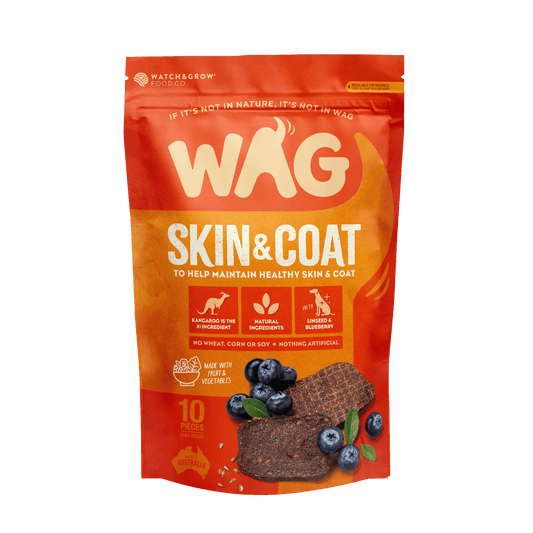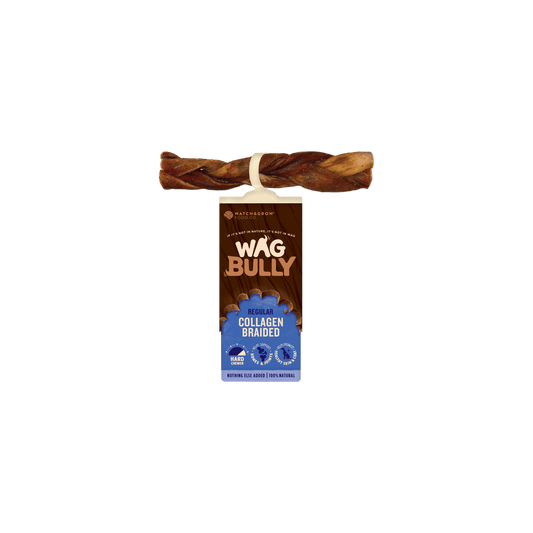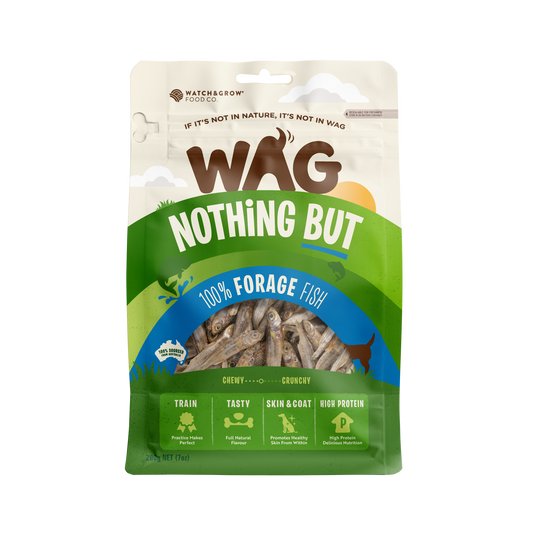Scratch that Itch: The WAG Guide To Dog Skin Conditions

Ever found yourself doing a double-take at your pup's incessant scratching? Maybe you're dealing with a rash that appeared out of nowhere, or pondering over a tiny bump, wondering if it's something more serious. Don't worry; we've got your back— read on to learn more about skin conditions commonly impacting our furry friends.
Understanding common canine skin complaints
Common dog skin conditions can range from dry skin and hot spots to more complicated issues like dermatitis, allergies and lumps. Symptoms often manifest as pesky itching, redness, inflammation, and even hair loss and bald patches, which can make your pup visibly uncomfortable.
Causes of this can be diverse—environmental irritants, food allergies, parasites like fleas, or underlying health issues.
Dry skin
Dry skin in dogs can be a common but often bothersome condition that manifests as flaky, itchy, irritated or scaly skin. If you've noticed your dog scratching more than usual, shedding dandruff-like flakes, or even showing signs of discomfort (think lots of licking or gnawing at their skin), you're probably dealing with a dry skin situation.
What are the causes of dry skin in dogs? Just like in humans, a variety of factors can cause dry skin in our four-legged friends. These can include low humidity, frequent bathing with harsh shampoos, allergies, poor diet, or underlying medical conditions like hypothyroidism.
A case of the flakes is not only a cosmetic issue—dry skin can genuinely make your dog uncomfortable. So, if your pup's got the itchies, it might be time to consult your vet for a skincare game plan that'll make your dog's tail wag for all the right reasons!

Hot spots
No, we're not talking about your dog's favorite place to bury their toys. Hot spots, or acute moist dermatitis, are those nasty, inflamed, and often oozy skin lesions. They're called 'hot' for a reason—these spots are warm to the touch and can appear seemingly overnight!
Typically, your dog starts with a little itch or irritation. Maybe it's an allergy or even a bug bite. But then, they can't resist the urge to scratch, lick, or chew, turning that tiny annoyance into a full-blown, painful sore. The area becomes moist, and bacteria swoop in for a party, making everything worse.
Because hot spots are both a symptom and a cause for more irritation, they can create a never-ending cycle of discomfort for your fur baby. So, if you spot a hot spot, high-tail it to the vet! They can help you pinpoint the cause, treat the area, and give you advice to prevent future flare-ups.
Dermatitis
Dermatitis is basically the VIP (Very Itchy Problem) of skin conditions, making your pup more frantic than a cat at a dog show. It's an inflammation of the skin that can be triggered by a slew of things—allergies, parasites, and even fungal or bacterial infections.
Your dog might be biting, scratching, or licking themselves pretty constantly, more so than usual. You'll often see red, inflamed skin, sometimes with bumps, and in severe cases even oozing sores (yikes!).
Now, dermatitis isn't a one-size-fits-all kind of deal. You've got Atopic Dermatitis triggered by environmental allergens (think pollen), Flea Allergy Dermatitis from—you guessed it—fleas, and even Food Allergy Dermatitis which is caused by certain ingredients in your dog's food.
So, if your fur baby's turning their scratching into a full-time job, it's time for a vet visit. Your vet will help sleuth out the cause and tailor a treatment plan faster than your dog can unroll a roll of toilet paper.
Identifying the root cause early is crucial for effective treatment, which can involve anything from oral antibiotics and topical creams to natural remedies and lifestyle changes. Always consult a veterinarian for an accurate diagnosis and tailored treatment plan.
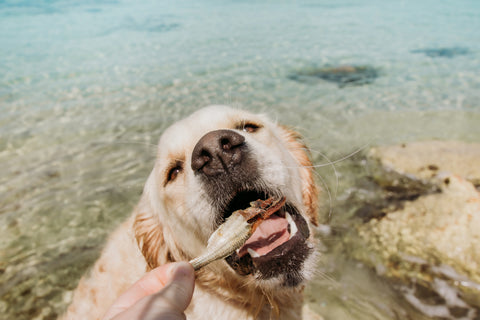
Fungal and yeast infections
Think of fungal and yeast infections on your dog's skin as sneaky party crashers! These unwelcome guests are caused by fungi or yeast going a bit wild, causing symptoms like itching, redness, and skin shenanigans. They might show up if your pup's skin isn't in its happy place due to factors like humidity, allergies, or even a lack of grooming sessions. But don't worry, it's not all doom and gloom. Your furry friend can kick these intruders to the curb with antifungal or antifungal shampoos and maybe even a vet-prescribed potion.
Dog skin allergies: the itch you can't scratch
Could your furry bestie be allergic to something in their Friday night meal? Or maybe it's the start of the Spring season that's turning your pup into a scratching machine? Whatever it is, food allergies or environmental allergies, an allergy test can help you stop playing the guessing game and start playing fetch with your pooch again!
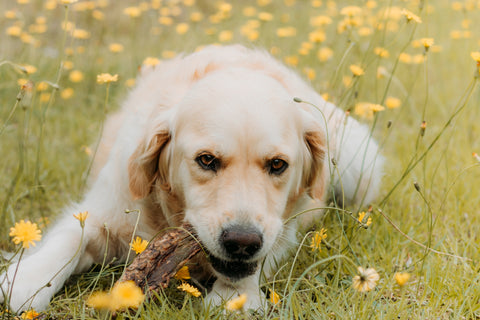
Lumps and bumps
Particularly as our furry friends age, you might notice some peculiar lumps and bumps appear on the skin which were not there before. These skin growths can be a source of concern for pet owners, as they may wonder whether these lumps are benign or potentially cancerous.
Benign Lumps: The majority of lumps and bumps found on a dog's skin are benign, or 'friendly lumps' meaning they are non-cancerous and generally harmless. Common benign skin growths in dogs include lipomas (fatty tumors), sebaceous cysts, warts, and skin tags. While these growths may not pose an immediate threat to your dog's health, they can sometimes cause discomfort or irritation. If a benign growth becomes inflamed, infected, or bothersome to your dog, check in with your veterinarian. In most cases, these benign lumps can be safely removed through a simple, non-invasive surgical procedure.
Cancerous Lumps: On the other hand, some skin growths in dogs can be cancerous. Skin cancer in dogs can manifest in various forms, including melanoma, mast cell tumors, and squamous cell carcinoma. Early detection of cancerous lumps is crucial, as timely intervention can significantly improve the prognosis and treatment options. Potential signs of concern include rapid growth, changes in colour, bleeding, ulceration, or a lump that seems to be causing pain or discomfort to your dog.
Monitoring and Action: To differentiate between benign and cancerous growths, it's essential to closely monitor any new lumps or bumps on your dog's skin. Regularly inspect your dog's body during grooming or cuddle sessions, paying attention to any changes in existing growths or the appearance of new ones. If you notice any suspicious lumps, it's best to consult your veterinarian ASAP. Together, you can address these worrisome lumps and ensure the best possible care for your dog's skin health.
Unleash the glow! How to promote healthy skin in dogs
You are what you eat
Think about it — when we eat well, our skin glows; the same goes for our four-legged family members. Our range of natural treats aren't just tasty; they're also packed with all the nutrients your dog needs for that gorgeous, glow-up coat. Try our brand new Functional Jerky for Skin & Coat and our classic Forage Fish for all the good skin-loving ingredients.
Combine our natural dog treats with a healthy, balanced diet suitable for your dog's size and age, and you're on the right track for healthy skin and a dazzling coat!
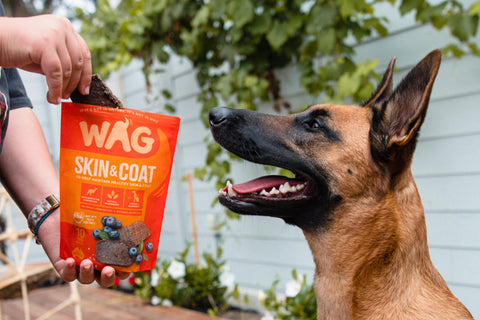
It's bath time!
A bath might not be your pooch's favourite activity but there are steps you can take to make it a more enjoyable experience for them. Using natural shampoos, warm water and mastering the fine art of canine massage can turn bath time into a skin-rejuvenating experience for your pet.
Remember bath time should only be an ‘every now and then’ exercise — as we don't want to strip those precious natural oils! Except of course, if your furry friend decides to roll in something particularly stinky.
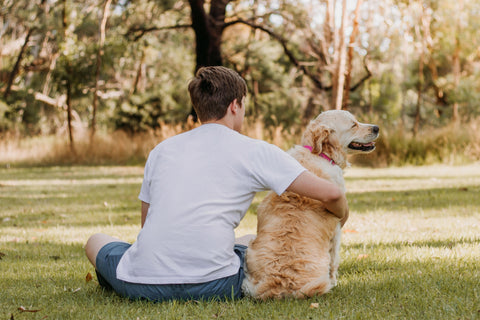
Flaunt that fur: natural dog treats for healthy skin and coat
While online tips can help get you on the right track, nothing beats a vet’s opinion for a professional diagnosis and treatment plan for dog skin conditions. If your dog is dealing with a constant case of the scratchies, or has had an unusual lump appear recently, it's always best to check in with your vet to rule out anything more serious.
But why wait for trouble when you can prevent it? Keep your pup’s environment nice and clean, give them regular grooms, and don’t forget to feed them a healthy balanced diet full of skin loving ingredients to support their skin health and keep their coats shiny and vibrant.
You can browse our range of healthy natural dog treats online via our website, or you can find us at Coles or major pet suppliers. At WAG, we don’t just offer treats; we offer wellness in a bite-sized, wag-worthy package.
Shop the Recipe
WAG Team
Up Next
A Dog Owner's Dive into Poolside Pooch Precautions

